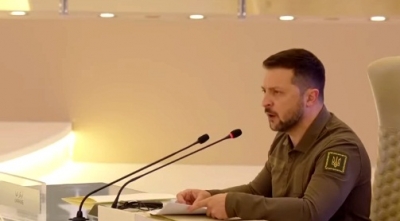Brussels: All eyes will be on NATO chief Jens Stoltenberg and Ukraine President Volodymyr Zelenskyy at Thursday’s European Union summit because their presence will underscore the importance the 27 EU leaders attach to protecting their eastern flank from Russian aggression and beefing up Ukraine’s defense capabilities.
Zelenskyy is set to address the gathering by video link and Stoltenberg will host an early lunch at the spring summit for leaders. But the biggest seat at the table will be reserved for something that’s not officially on the agenda: the fallout from the stunning weekend mutiny in Russia.
“It will be the elephant in the room,” said a high-level EU diplomat who asked not to be identified because the summit still had to open.
Officials from several member states and EU institutions said the chaos and instability created by the rebellion would not only force the EU to double down on its support for Ukraine with commitments for more ammunition but also to ensure fighting and violence do not spill over into the bloc itself.
“There is no room for hesitation,” said Estonian Prime Minister Kaja Kallas. “We must continue to increase the price of Russian aggression.”
Within the EU, some are saying that the effects of the mutiny reach right into the Kremlin.
“In any case, they will certainly have a long-lasting impact in Russia,” German Chancellor Olof Scholz told the broadcaster ARD. “I do believe that (Russian President Vladimir Putin) has been weakened.”
Scholz was saying aloud what many EU leaders have been hoping. And they see the increasing impact of 11 sets of sanctions that the EU has imposed in conjunction with the United States as key.
And even if the EU holds back from offering any military guarantees, the prevailing mood is for leaders to toughen the language in their summit conclusions. In the latest draft, obtained by the Associated Press, the leaders say they “stand ready to contribute, together with partners, to future security commitments to Ukraine, which will help Ukraine defend itself in the long term, deter acts of aggression and resist destabilization efforts.”
Most EU nations are also members of NATO, and at the July 11-12 alliance summit, they will look to offer Ukraine more security guarantees if stopping short of full NATO membership.
That approach for more support is expected to be fully endorsed by the time the two-day summit ends.
EU nations have also been providing billions in aid to both beef up Ukraine’s military stockpiles and to make sure the country’s battered economy stays afloat. EU leaders will also look more closely at using Russia’s frozen assets – estimated at some 200 billion euros – for that purpose.
Several countries fear the legal ground for that is still too shaky and the European Central Bank has warned that confiscating those assets or profits accrued from them could pose a serious risk to the reputation of the euro. Officials said that some countries want to impose an additional windfall levy on the money to use for Ukraine’s reconstruction.
AP





